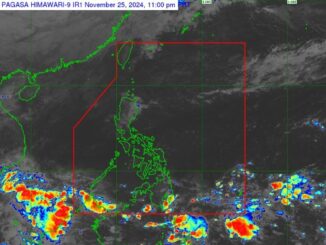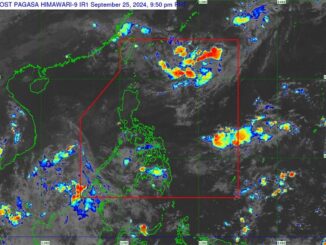
MANILA, Philippines — Local government units (LGU) in Metro Manila appealed to the Philippine Atmospheric, Geophysical and Astronomical Services Administration (PAGASA) to release an “early” weather report for them to be able to determine whether or not to suspend classes and work schedules during inclement weather.
The LGUs recommended to the state weather bureau to issue weather forecasts at 3:30 a.m., according to the Metropolitan Manila Development Authority (MMDA). This schedule would enable them to decide whether or not to suspend classes and work in government, the agency said.
The proposal was brought up during the third-quarter Metro Manila Disaster Risk Reduction and Management Council (MMDRRMC) meeting last Wednesday at the MMDA headquarters in Pasig City.
MMDA acting Chairman Romando Artes, also MMDRRMC chairman, presided over the meeting while heads of DRRM offices in Metro Manila attended.
At present, PAGASA issues weather bulletins every 5 a.m. and 11 a.m., and every 5 p.m. and 11 p.m. – or every six hours – when tropical cyclones are present inside the Philippine area of responsibility.
It also announces heavy rainfall warnings every three hours, as well as other weather-related reports regularly, all of which are posted on its social media accounts.
Netizens, especially parents of schoolchildren, criticized LGUs on social media and blamed them for what they thought were “late” declaration of class and work suspension during stormy weather when they were already out of their houses.
At the same meeting, the MMDA and the Department of Public Works and Highways started formulating the Regional Flood Management Plan, along with similar plans on drainage and flood control infrastructure in Metro Manila, according to the MMDA.
‘New normal’
Filipinos should adapt to the “new normal” brought about by climate change, President Marcos said, as he warned that the phenomenon, which has been linked to natural disasters and extreme weather conditions, poses more risk than the pandemic.
In a video message for a climate change summit in Pasay last Wednesday, Marcos called for a change of mindset on the phenomenon, which he described as a huge challenge not just for the Philippines, but for the entire world.
“We will adapt already to the new reality. ‘New normal’ was used extensively during the pandemic. Well, it applies also when it comes to climate change,” the President said.
He cited the need to undertake adaptation measures such as determining what rice varieties can withstand temperature changes, declaring no-build zones in typhoon-prone areas and transferring residents who live in hazardous places. – Alexis Romero





Be the first to comment